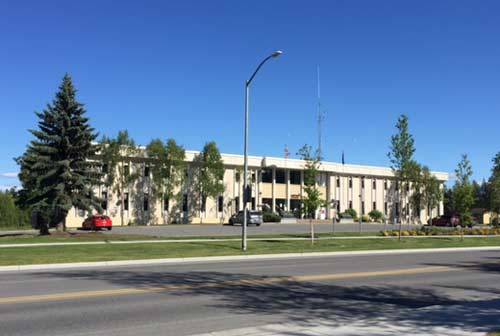The Kenai Peninsula Borough Assembly’s policy on who can give invocations had its day in court.
The American Civil Liberties Union and the Kenai Peninsula Borough’s lawyers argued the case before Alaska Superior Court Judge Andrew Peterson in Anchorage on Wednesday. The sides didn’t disagree about any of the material facts leading up to the case but disagreed about a number of particulars, including whether the assembly’s current policy constitutes a violation of freedom of speech and freedom of association.
Following a controversy over an invocation delivered by a member of the Satanic Temple in August 2016, the assembly passed a policy requiring anyone delivering an invocation to be a member of an association with an established presence in the Kenai Peninsula Borough that meets primarily for religious purposes, or a chaplain serving a fire department, hospital, the military or other similar organizations. In December 2016, the ACLU sued, saying the policy unfairly stopped individuals who were not part of established religions from giving invocations.
Lawyers for both sides argued their points in the hearing Wednesday, with the borough holding that the invocations are government speech and thus do not violate the establishment clause, which prohibits governments from establishing a religion, and that the people giving invocations are not speaking publicly as private individuals but as designated agents of the government.
Attorney Kevin Clarkson, who represented the borough, said the policy is open to any religion as long as it’s an association with a presence in the Kenai Peninsula Borough and that the policy does not actually define what an association is.
“The borough doesn’t have to go seek anybody out, but they’ve created the opportunity by which any association can take the avenue to give the invocation,” he said.
ACLU attorney Eric Glatt, who represents three plaintiffs from the peninsula, argued that the people giving invocations do so with individual speech and that the policy effectively blocks anyone not part of an association with enough people on the Kenai Peninsula to formally establish itself. One of the plaintiffs, Elise Boyer of Homer, falls into this situation, as there are not enough people who identify as Jewish in Homer nor a rabbi or priest to establish a synagogue, and thus she cannot meet the criteria to give an invocation, Glatt said.
Altogether, the ACLU has levied claims of the violation of freedom of speech, freedom of association, a failure to provide equal protection under the law and a violation of the establishment clause.
“(The borough has) to clear all four of these hurdles for the policy to remain intact,” he said.
Peterson heard the arguments for a little more than an hour Wednesday before retiring to consider the information and make a decision.
Reach Elizabeth Earl at eearl@peninsulaclarion.com.

